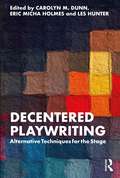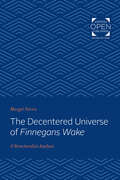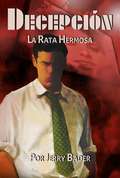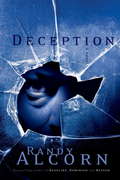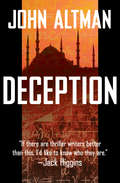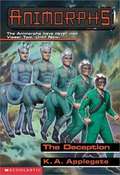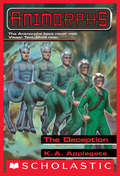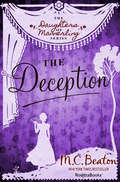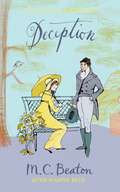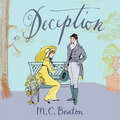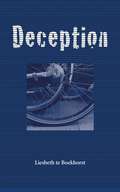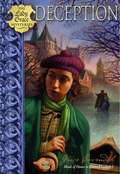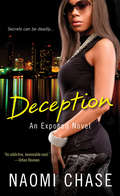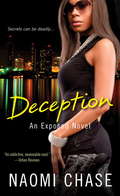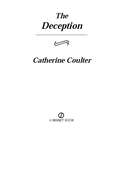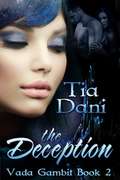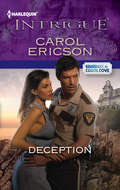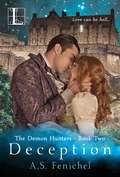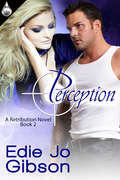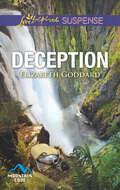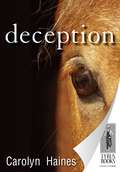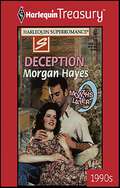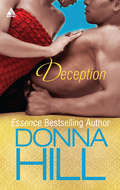- Table View
- List View
Decentered Playwriting: Alternative Techniques for the Stage
by Carolyn M. DunnDecentered Playwriting investigates new and alternative strategies for dramatic writing that incorporate non-Western, Indigenous, and underrepresented storytelling techniques and traditions while deepening a creative practice that decenters hegemonic methods. A collection of short essays and exercises by leading teaching artists, playwrights, and academics in the fields of playwriting and dramaturgy, this book focuses on reimagining pedagogical techniques by introducing playwrights to new storytelling methods, traditions, and ways of studying, and teaching diverse narratological practices. This is a vital and invaluable book for anyone teaching or studying playwriting, dramatic structure, storytelling at advanced undergraduate and graduate levels, or as part of their own professional practice.
The Decentered Universe of Finnegans Wake: A Structuralist Analysis
by Margot NorrisOriginally published in 1977. The pioneer critics of Finnegans Wake hailed the work as a radical critique of language and civilization. Resuming their position, Margot Norris explains the book's most intractable uncertainties not as puzzles to be solved by a clever reader but as manifestations of a "chaosmos," a Freudian dream world of sexual transgression and social dissolution, of inauthentic being and empty words. Conventional moralities and restraints are under siege in this chaosmos, where precisely those desires and forbidden wishes that are barred in waking thought strive to make themselves felt. Norris demonstrates convincingly that the protean characters of Finnegans Wake are the creatures of a dreaming mind. The teleology of their universe is freedom, and in the enduring struggle between the individual's anarchic psyche and the laws that make civilization possible, it is only in dream that the psyche is triumphant. It is as dream rather than as novel that Norris reads Finnegans Wake. The lexical deviance and semantic density of the book, Norris argues, are not due to Joyce's malice, mischief, or megalomania but are essential and intrinsic to his concern to portray man's inner state of being. Because meanings are dislocated—hidden in unexpected places, multiplied and split, given over to ambiguity, plurality, and uncertainty—the Wake, Norris claims, represents a decentered universe. Its formal elements of plot, character, discourse, and language are not anchored to any single point of reference; they do not refer back to center. Only by abandoning conventional frames of reference can readers allow the work to disclose its own meanings, which are lodged in the differences and similarities of its multitudinous elements.Eschewing the close explication of much Wake criticism, the author provides a conceptual framework for the work's large structures with the help of theories and methods borrowed from Freud, Heidegger, Lacan, Levi-Strauss, and Derrida. Looking at the work without novelistic expectations of the illusion of some "key" to unlock the mystery, Norris explores Joyce's rationale for committing his last human panorama—a bit sadder than Ulysses in its concern with aging, killing, and dying—to a form and language belonging to the deconstructive forces of the twentieth century.
Decepción: La Rata Hermosa
by Jerry BaderEl mundo es un lugar peligroso, y cada Nación tiene hombres y mujeres encargados de protegerlas. Estas personas tienen varios nombres: agente secreto, oficial de inteligencia, y analista son sólo algunos de ellos. Harry es una de esas personas. Él es un analista. Él pasa su tiempo leyendo, investigando, y analizando, seguido de la redacción de reportes que casi nunca salen a la luz. Harry es muy inteligente, con un trabajo aparentemente importante, pero Harry está aburrido. Aburrido, porque los analistas nunca logran ser el héroe, nunca son quienes ordenan cocteles agitados ni batidos, y, nunca, nunca, se quedan con la chica. Harry está frustrado, frustrado porque sus superiores le comunicaron que el reporte en el que acaba de pasar seis meses trabajando será archivado, y no, no puede trabajar en un operativo de campo para darle seguimiento. Harry tiene un defecto muy peligroso en su personalidad, tiene imaginación, algo que Los Superiores no aprecian. Harry necesita probarse a sí mismo; necesita algo de emoción en su vida, y esa emoción llega en un mortal paquete de intriga y asesinato que combina algo llamado el Proyecto Hermanas con una maestra del espionaje Rusa, H. K. Kyrsa, alias, la Rata Hermosa, y la devastadoramente bella Harriet. La pregunta es, ¿Estará todo ocurriendo sólo en la cabeza de Harry? ¿O en realidad hay un complot que necesita ser frenado? ¿Estará Harry simplemente loco? ¿O los Rusos están dispuestos a meterse en problemas con el Occidente una vez más? Harry está sólo, no está seguro de en quién puede confiar. ¿Habrá algunos chicos buenos en el mundo del espionaje? La única forma de averiguarlo es encontrar a Kyrsa, la Rata Hermosa. Acompaña a Harry en esta búsqueda de lo que podría no ser real.
Deception: Three Novels: Deadline, Dominion, Deception (Ollie Chandler Series #3)
by Randy Alcorn"Messin' with me's like wearin' cheese underwear down rat alley."-Ollie ChandlerHomicide detective Ollie Chandler has seen it all. Done more than he cares to admit. But when he's called to investigate the murder of a Portland State University professor, he finds himself going places he's never gone before.Places he never wanted to go.Because all the evidence is pointing to one horrific conclusion: The murderer is someone in his own department. That's not the worst of it, though. Ollie has nagging doubts...about himself. Where was he during the time of the murder?Joined by journalist Clarence Abernathy and their friend Jake Woods, Ollie pushes the investigation forward. Soon all three are drawn deep into corruption and political tensions that threaten to destroy them-and anyone who tries to help. But they're in too deep to quit. They've got no choice. They have to follow the evidence to the truth...No matter how ugly-or dangerous-it gets.A gripping story of murder and spiritual struggle, Deception proves, as never before, the truth of Ollie's first law: "Things are often not what they appear."From the Hardcover edition.
Deception
by John AltmanA young woman finds herself in hot water in this international thrill ride from the acclaimed author of A Gathering of Spies and A Game of Spies When Hannah Gray discovers that her lover and business partner has implicated her in a massive act of insurance fraud, she flees Chicago rather than going to the police. An Adriatic cruise will help to clear her head, she reasons, and give her time to plan her next move. On the ship, Hannah meets Renee Epstein, an elderly woman whose husband is also a fugitive, on the run from a top-secret government agency that wants to use his scientific research for a purpose he never intended. Scribbled into the couple's guidebook is the formula for a powerful new energy source with incredible destructive capabilities. Hannah borrows the book, and shortly thereafter, the Epsteins are murdered. Suddenly Hannah is the target of an assassin whose talents are as unique as they are deadly. Pursued from the Greek islands to Istanbul to the South of France, Hannah hopes to stay alive long enough to turn her bad fortune around. Thousands of miles from everything and everyone she knows, she decides to reinvent herself--or die trying.
The Deception (Animorphs #46)
by K. A. ApplegateNo more subtle invasion: Visser Three wants to start World War Three. It's way beyond anything the Yeerks have tried before. Is there anything the Animorphs can do to stop it?
The Deception (Animorphs #46)
by K. A. ApplegateThe Animorphs have managed to contact the Andalite home world, but the battle is far from over. Visser Two has arrived on Earth, and he's not happy about the state of things. He decides the best way to take over Earth is to have the humans destroy each other, exhausting their weapons in the process. He's going to start World War III.Ax and his friends know that Visser Two means business. There are only two ways to keep him from destroying everything they know: Find a way to stop the war, or find a way to stop him forever...
The Deception (The Daughters of Mannerling Series #3)
by M. C. BeatonThe saga of the Beverley sisters continues as one hatches a clever plot in this Regency romance by the bestselling author of the Agatha Raisin series.After their father gambled away Mannerling, their ancestral home, the Beverley sisters become obsessed with winning it back. Abigail&’s two older sisters tried and failed, letting the responsibility fall to her. Marrying Harry Devers, the lecherous son of the manor&’s present owner, isn&’t an appealing option. To wed the dashing Lord Burfield, recently returned from the war, feels like a better choice.Then Harry suffers a fall from a horse, forcing him to recuperate in the Beverley home. When Abigail&’s twin sister Rachel nurses the rake back to health, Harry proposes marriage. While Rachel has her doubts, Abigail has an idea that just might return Mannerling to the hands of the Beverleys.Praise for M. C. Beaton &“The best of the Regency writers.&”—Kirkus Reviews &“Nobody writes Jane Austen like [M. C. Beaton].&”—Detroit Free Press &“A delightful tale…romance fans are in for a treat.&”—Booklist &“Nicely atmospheric, most notable for its gentle humor and adventurous spirit.&”—Publishers Weekly
Deception: A Novel Of Regency England - Being The Third Volume Of The Daughters Of Mannerling (The Daughters of Mannerling Series #4)
by M.C. BeatonWhen one of her sisters is attacked by Harry Devers, the lecherous son of Mannerling's present owner, Abigail Beverley puts her obsession with reclaiming the mansion on hold. Then Abigail meets the dashing and extremely eligible Lord Burfield, fresh back from the army and in full-time pursuit of a bride.Yet unexpected circumstances force the insufferable Harry Devers to recuperate from a riding accident in the Beverley home, where Abigail's twin sister Rachel nurses him back to health - and into betrothal. Stirred from its brief slumber, Abigail's fury returns, alive and kicking. So when Rachel begins to have doubts about marrying Harry, Abigail devises a daring plan to win back Mannerling once and for all.But perhaps Abigail would be better off concentrating on Lord Burfield, lest he be snapped up by Prudence Makepeace!
Deception (The Daughters of Mannerling Series)
by M.C. BeatonWhen one of her sisters is attacked by Harry Devers, the lecherous son of Mannerling's present owner, Abigail Beverley puts her obsession with reclaiming the mansion on hold. Then Abigail meets the dashing and extremely eligible Lord Burfield, fresh back from the army and in full-time pursuit of a bride.Yet unexpected circumstances force the insufferable Harry Devers to recuperate from a riding accident in the Beverley home, where Abigail's twin sister Rachel nurses him back to health - and into betrothal. Stirred from its brief slumber, Abigail's fury returns, alive and kicking. So when Rachel begins to have doubts about marrying Harry, Abigail devises a daring plan to win back Mannerling once and for all.But perhaps Abigail would be better off concentrating on Lord Burfield, lest he be snapped up by Prudence Makepeace!
Deception
by Liesbeth Te BoekhorstRichard had everything he could wish for: a lovely wife, a well-paying job, a beautiful house. Richard had even more: an unhealthy interest in female beauty and the annoying habit of picking at other people's old wounds. One person seemed to have enough. But who? Linda, the new neighbour, also Richard's former lover? Desiree, Richard's latest conquest? Joshua, the neighbour from across the street? Or one of the other people who were the victim of Richard's sly digs?
Deception: The Lady Grace Mysteries, Book 4
by Jan Burchett Sara VoglerQueen Elizabeth is furious at the production delays of her new coin. To escape her bad temper, Lady Grace and her fellow Maids of Honour skate down the frozen River Thames to the eagerly anticipated Frost Fair. But a gruesome discovery on the ice-a dead man with coins covering his eyes-interrupts the winter revelry. As the Queen's Lady Pursuivant, Grace must unravel the mystery. Uncover a dangerous world of counterfeiting and corruption inside the private daybooke of Lady Grace, the queen's favorite Maid of Honour. All miscreants and ill-thinkers, keep out! The Lady Grace Mysteries come to us from the most privy and secret daybooke of Lady Grace Cavendish, Maid of Honour to her Gracious Majesty, Queen Elizabeth I of that name.
Deception (Exposed Series #2)
by Naomi ChaseSisters can share too much. . .Acquitted of murder, Tamia Luke is on a mission to reclaim all she's lost, including her ex, Brandon. He's about to get married, but Tamia's determined, even if it means resorting to deception--a family habit. Her sister, Fiona, betrayed Tamia to save her own skin. Now the two share a scandalous secret that may destroy both their plans to start over. . . Fiona's hoping her new job will help her score a rich husband. It's looking good, until she's seduced by the one man who is truly unattainable. And both sisters will have to steer clear of someone who knows too much, and wants them to pay--with their lives. . .
Deception
by Naomi ChaseSisters can share too much. . . Acquitted of murder, Tamia Luke is on a mission to reclaim all she's lost, including her ex, Brandon, who saved her life. Brandon's about to get married, but Tamia's determined, even if it means resorting to deception--a family habit. Her sister, Fiona, betrayed Tamia to save her own skin. Now the two share a scandalous secret that may destroy both their plans to start over. . . Fiona's hoping her glitzy new job will help her score a rich husband. It's looking good, until the night she's seduced by the one man who is truly unattainable--unless she can keep her past hidden. And both sisters will have to steer clear of someone who knows too much, and wants them to pay--with their lives. . .
Deception
by Naomi ChaseSisters can share too much. . .Acquitted of murder, Tamia Luke is on a mission to reclaim all she's lost, including her ex, Brandon, who saved her life. Brandon's about to get married, but Tamia's determined, even if it means resorting to deception--a family habit. Her sister, Fiona, betrayed Tamia to save her own skin. Now the two share a scandalous secret that may destroy both their plans to start over. . . Fiona's hoping her glitzy new job will help her score a rich husband. It's looking good, until the night she's seduced by the one man who is truly unattainable--unless she can keep her past hidden. And both sisters will have to steer clear of someone who knows too much, and wants them to pay--with their lives. . .
The Deception (Daughters of Mannerling, Book #3)
by Marion ChesneyThe near-rape of Jessica, the second eldest of the six Beverley daughters, by Harry Devers, the lecherous son of Mannerling's present owners, has momentarily cooled her sister Abigail's obsession with Mannerling. At this perfect moment--with her mind freed from thoughts of Harry or Mannerling--Abigail meets the tall, rich, handsome, and extremely eligible Lord Burfield, who has decided to quit the army, settle down to the life of a landowner, and find a bride. But then Harry Devers has a riding accident that forces him to recuperate in the Beverleys' new house. All too soon after Rachel, Abigail's identical twin, nurses Harry back to health, she finds herself engaged to him--and Abigail finds her obsession with Mannerling reawakened. When Rachel begins to have second thoughts about marrying Harry, Abigail comes up with a daring plan to regain Mannerling once and for all. Will it succeed? Should it succeed? Perhaps Abigail would be better off concentrating her attentions on Lord Burfield, who is about to be snapped up by Prudence Makepeace.... Scotswoman MARION CHESNEY, the award- winning author of five previous Regency series--The Poor Relation, The School for Manners, A House for the Season, The Six Sisters, and The Travelling Matchmaker--lives in England. Read the entire Sisters of Mannerling series including #1 The Banishment #2 The Intrigue, #4 The Folly, #5 The Romance and #6 The Homecoming You will find many more appealing historic romance novels by this beloved author in the Bookshare collection. They are filled with fascinating historic detail, humor, wisdom and understanding of human nature. Look for such titles as: the complete six volumes of the Six Sisters series beginning with #1 Minerva, the Rake's Progress from the A House for the Season series and Back in Society from The Poor Relation series. Marion Chesney also uses the name M. C. Beaton (Marion Chesney Beaton), and you'll find many more books to complete some of these series by searching under this name.
The Deception (Baron #3)
by Catherine CoulterThe complete revamping of Catherine Coulter's 1983 Signet Regency, An Intimate Deception, led to this: a full-bodied historical romance with a new beginning and a new ending.
The Deception: Vada Gambit Book 2 (Vada Gambit #2)
by Tia DaniEver since Solena accepted the Vada crown and took control of the galaxy, treachery threatens. It’s everywhere. Confusion runs unceasing among the high-ranking leaders within the Planetary Federation. Friends and enemies no longer seem obvious. Someone, somehow, is orchestrating the misunderstandings. But who? While Solena struggles to maintain order in the once peaceful galaxy, two, major, more personal concerns occupy her mind. What happened to her beloved missing sister, Lauren? And why does her husband suddenly fight her every decision, something Erik swore he’d never do? A brutal, calculating, adversary behind the oncoming Harmageddon thrives on deception. His next attack centers on Solena’s husband. Have Erik removed forever and blame it on Solena.
Deception
by Carol EricsonColumbella House, a crumbling Victorian mansion on the coast, is packed with secrets and danger. Now it all belongs to Mia St. Regis. For police chief Dylan Reese, the return of the beautiful heiress rekindles an old attraction, one he thought ended long ago. Before he can focus on their past, though, Mia's reappearance rouses a killer, someone who's made her the ultimate-and most prized-target. Dylan knows keeping Mia safe is part of the job. Yet the image of an elusive enemy getting anywhere near her challenges his sworn vow to uphold the law-and stirs something all too personal inside by-the-book Dylan....
Deception (Demon Hunters #2)
by A. S. FenichelWhen Demons threaten Regency London, only a Lady can stop them.Lillian Dellacourt is beautiful, refined and absolutely lethal. She's also the most feared and merciless demon hunter in The Company. She's come a long way from the penniless seamstress's daughter sold to the highest bidder, and it wasn't by trusting a man, let alone an exiled Marquis with more on his mind than slaying the hellspawn . . .For Dorian Lambert, Marquis de Montalembert, being sent to keep track of Lillian is no mean task. He's wanted the fiery vixen since he first heard of her five years ago. But wooing the lady while fighting the demon uprising is no easy feat, especially when the lady's tongue is as sharp as the Japanese sai blades she favors for eviscerating the spawn of hell.These two will have to learn to trust each other fast, because the demon master is back, and he's planning to turn Edinburgh into a living hell...
Deception
by Edie Jo GibsonHe is not who he appears to be ... but neither is she. Frankie Palmer is a seeker of justice, and by joining forces with black ops specialist Ethan Drake, she may finally be able to take down the drug lord that is terrorizing the innocent citizens of her community. Edie Jo Gibson takes you on a suspense-filled adventure in her new romance, Deception.Bartender by night, neighborhood hero by day. Frankie Palmer is no stranger to seeking justice on criminals terrorizing innocent civilians. After all, she owns a bar called Retribution, and has an agenda for finding the drug lord responsible for putting her brother in a coma. Utilizing social networks, Frankie and her team of community members protect their own.Six years ago, military strategist and leader of a black ops unit Ethan Drake nearly captured Christian Briggs, a world-renowned drug dealer and arms trader. But the criminal eluded him during a disastrous operation, resulting in the death of Ethan's brother, an act Ethan has never recovered from, vowing to bring Briggs to justice. Frankie shows up in the crosshairs of Ethan's scope while she is on the trail of an identity thief wiping out accounts of elderly community members. The thief stole the identity of Christian Briggs, raising red flags and attracting Ethan.Both teams reluctantly band together to bring down Briggs. Even though Ethan believes Frankie may be working for Briggs, he chooses to work side by side, battling an attraction for Frankie he has never felt for any other woman. Frankie fights Ethan every step of the way, refusing to forgive his deception, even when her heart tells her otherwise. Releasing rats, portraying a hooker, and allowing a grandma to plant a tracking device on Briggs, leads them to realize not everyone is who they seem to be.Content Notes: Sweet, Contemporary, Suspense, Action, Adventure
Deception (Mountain Cove #6)
by Elizabeth GoddardAn Alaskan widow must rely on a police chief to help find her attacker in this inspirational romantic suspense mystery by a USA Today–bestselling author.Jewel Caraway thought she’d left her mistakes in the past—but then her past arrives at her door. Though she’s thrilled to reunite with her estranged sister, something about her sister’s new husband makes Jewel uneasy. Does he know her secret? Is he the one behind the growing list of attacks against her? And if he is involved . . . does that mean her sister is, too? With nowhere else to turn, Jewel must rely on police chief Colin Winters—the first man to make the widow question her resolve to never love again. But will he stay by her side when her guarded secrets are revealed?Experience more action-packed mystery and suspense in the rest of the Mountain Cove series by Elizabeth Goddard.
Deception
by Carolyn HainesRiding instructor Connor Tremaine returns to her home ground in Mobile, Alabama and ends up married to Clay Sumner, a charismatic politician. On the surface, this is an ideal life, but Connor discovers that things are not as they appear in Clay's world. Not with this home or his children, and she begins to fear that he may not be telling all he knows about his first wife's death.
Deception (9 Months Later)
by Morgan Hayes9 MONTHS LATERHer mistake was falling in love with a cop. Now she's pregnant-and he's missing.Shelby Beaumont is madly in love with homicide detective Johnny Spencer. They've been together for the past year; they've just become engaged. And though Johnny doesn't know it yet, Shelby's pregnant with his child.But Johnny's been investigating a possible case of police corruption. And someone on the force has found out....Then a bomb is rigged on Johnny's boat. And Johnny's on it.Or is he?
Deception
by Donna HillIs love worth the risk...An unhappy marriage taught Terri Powers never to trust again. Instead, she put all her energy into developing her inner strength and independence-creating the successful New York advertising agency she'd always dreamed of. Then she meets handsome, strong-willed businessman Clinton Steele. Try as she might, Terri can't fight the sensual attraction between them-or the desperate hunger that fires her deepest passions......when everything is at stake?Neither Terri nor Clinton can ever imagine just how much is at risk. But when a stranger appears from Terri's forgotten past who calls himself a friend-his deception could destroy everything Terri has fought so hard to build. Now two wary hearts have to persevere, as long-buried secrets put Terri and Clinton's love to the most perilous test of all...
